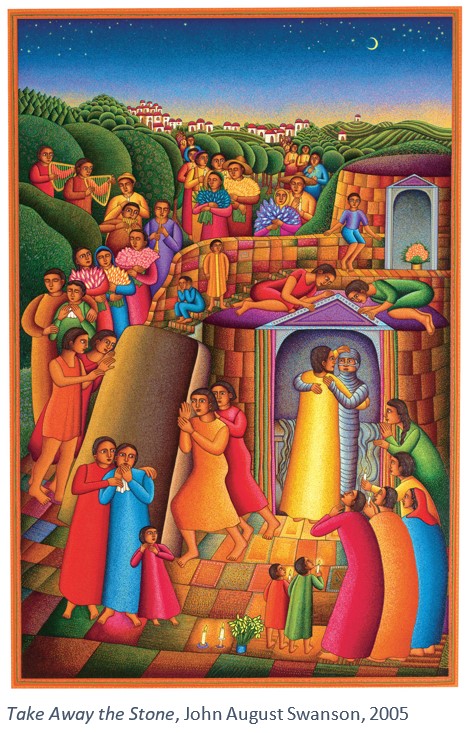 Jesus said, “Take away the stone.” Martha, the sister of the dead man, said to him, “Rabbi, already there is a stench because it has been four days.” Jesus said to her, “Did I not tell you that if you believed, you would see the glory of God?” ~John 11:39-40 As we recall from last Sunday Martha’s intense conversation with Jesus in just the previous verses, we may call to mind that phrase from the Markan story of the healing of a child, and the cry of the father for faith: “I believe; help my unbelief!” (Mark 9:24). Martha has testified to her belief in the power of God, embodied in Jesus over life and death, indeed, in and out of time, eternal. And yet, as the prospect of the stone’s removal becomes immanent, even Martha’s default is to doubt. How much more so us? How much more so in these times? We believe; help our unbelief! To what extent do we still have to give ourselves to this Gospel and this Way? What are those tombs that the Holy longs to open in us and in our communities and in the Church? Sunday Readings: 7th Sunday of Easter: Acts 18:24–27 † Psalm 111 † 1 Peter 1:3–9 † John 11:28–44
We continue to keep our financial commitments to our mission partners and staff. If you are not yet able to join us, thank you for remembering to send in your financial pledges and offerings or donating here.
0 Comments
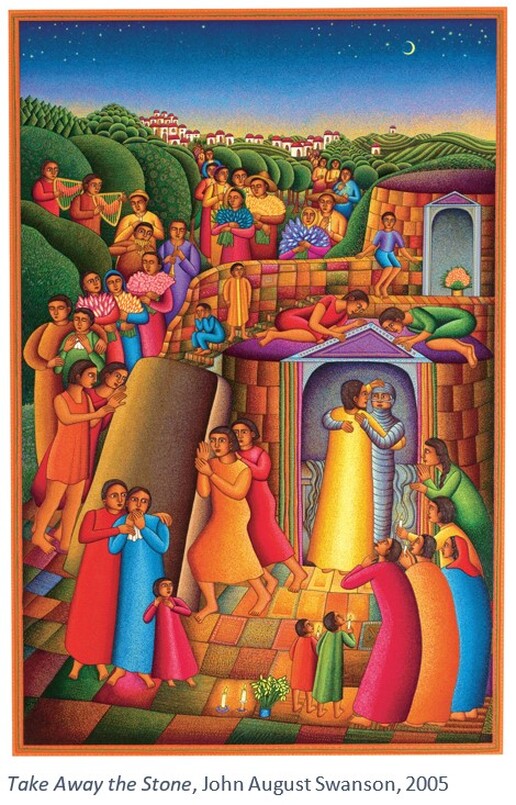 Martha said to Jesus, “Rabbi, if you had been here, my brother would never have died. ~John 11:21 Death is all around this Easter story. If we recall the whole of it (John 11:1-45), we will remember how complicated things are. Jesus hears the news of his beloved Lazarus’ illness and sees the writing on the wall. He will not survive it. Yet, inextricably, he waits two days before making his way back to Bethany and to Lazarus and Mary and Martha. It turns out Jesus’ life is also threatened. The disciples are certain a return to Bethany could mean the death of Jesus, and, indeed, the story ends with this death knell written as well on said wall: the plot to kill Jesus is formalized. Death surrounds this Easter story. But what a story! It turns out it is all about life, resilient, brimming, hopeful, clear-eyed. Remarkable faith rises up amidst it all, indistinguishable from an abiding love. Our short section alights on faith spoken into what seems not just dead, but dead dead: “If you had been here, my brother would never have died.” What does this mean? Is it true? Or better: how is it true? How is it true for Lazarus who will breathe again in just a few moments, only to eventually die again? How is it true for Mary, and perhaps even more poignantly for Martha? And how is it true for us and for this world that seems to be hurtling apart from one another? “…everyone who believes in me, even though they die, they will live, and everyone who lives and believes in me will never die.” Sunday Readings: 6th Sunday of Easter: Acts 17:1–4, 10–12 † Psalm 145:8–19 † Romans 6:5–11 † John 11:17–27
We continue to keep our financial commitments to our mission partners and staff. If you are not yet able to join us, thank you for remembering to send in your financial pledges and offerings or donating here.
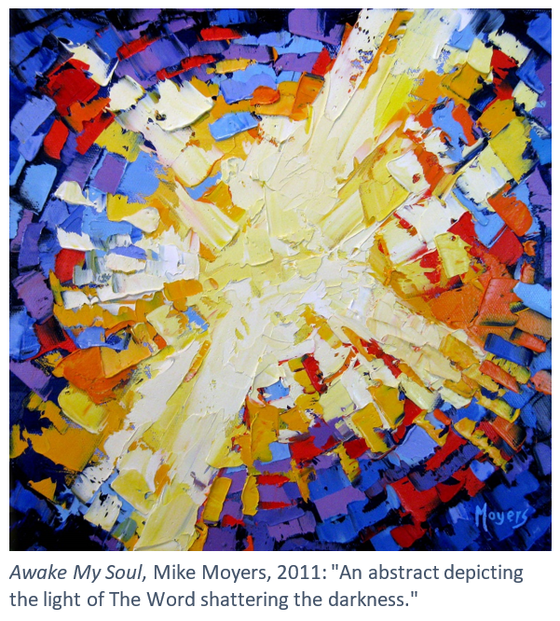 “Truly, truly, I tell you all, the hour is coming, and is now here, when the dead will hear the voice of the Son of God, and those who hear will live. … Do not be astonished at this; for the hour is coming when all who are in their graves will hear his voice and will come out. ~John 5:25, 28 In John, Jesus seems remarkably unconcerned with distinguishing between the spiritually dead and the physically dead. Past, present, and future are equally muddled. Double-meanings, strange images—ambiguity abounds in this gospel. But there is no question that things happen. Things happen when the voice of the Holy speaks. Life in abundance happens. Harvard University recently made news for its work to uncover the story of its slave-owning past. After releasing an initial report, it created a fund to help tell an even more complete story about how it came to be. A “more complete story” seems to be operative here. The kind of new life Jesus speaks to has everything to do with the voice of truth—a more complete story of who we are under the banner of heaven—drawing us to salvation. What are the stories that we need to uncover—to tell and to hear—to bring us to new life? “…the dead will hear the voice of the Son of God, and those who hear will live.” Readings: 5th Sunday of Easter: Acts 5:12–16 † Psalm 147:12–20 † 2 Corinthians 4:13–15 † John 5:25–29
We continue to keep our financial commitments to our mission partners and staff. If you are not yet able to join us, thank you for remembering to send in your financial pledges and offerings or donating here.
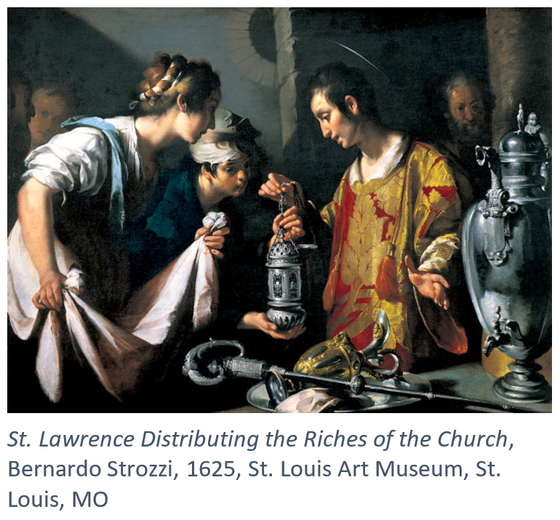 “Go and take this news to John, what you have seen and heard: those who were blind receive sight, those who were lame walk, those who were diseased-in-skin are cleansed, those who were deaf hear, those who were dead are raised, those who are poor have good news proclaimed to them. ~Luke 7:22 The Christian faith is about relationships. It has always been about relationships. John’s followers aren’t sure what to do with Jesus and his followers. Are they about the same thing? Is he what we have been looking for? What is the meaning of this? So they go to them. They ask. They listen deeply. They build a relationship. Go tell John what you see and hear, Jesus tells them. Our own recent history of Christianity has found us thinking of mission as one-directional. Those of “us” centered in the culture, with the resources and the power give for the blessing of others in need. We are learning, though, to move beyond forms of charity to unequals to mutuality among equals whose stories and lived experiences are different from our own and allow us to experience mutually transformative relationships. Hermán, a sibling and wise guide from the Colombia Presbyterian church says it this way: the church was never designed to build community just for us. The blind see, the lame walk, death is overcome, good news to the poor—in spirit and in truth—good news for all! Readings: 4th Sunday of Easter: Acts 2:22–24 † Psalm 9:9–14 † 2 Corinthians 4:7–12 † Luke 7:18–23
We continue to keep our financial commitments to our mission partners and staff. If you are not yet able to join us, thank you for remembering to send in your financial pledges and offerings or donating here.
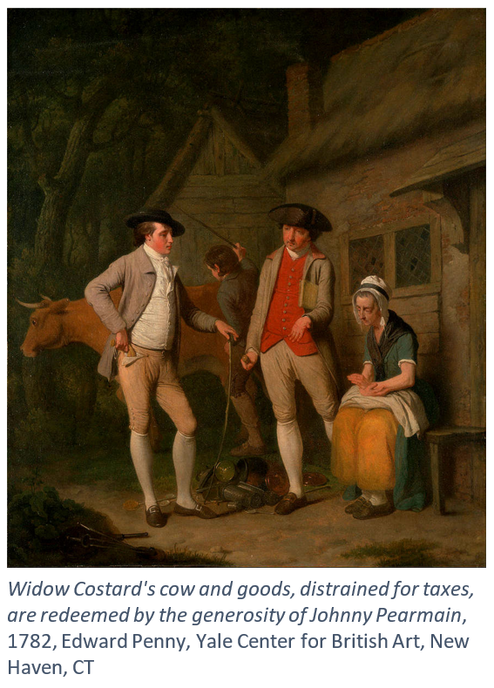 The same day [that Jesus taught about taxes] some Sadducees came to him, … and they questioned him, saying, “Teacher, Moses said, ‘If a man dies without having children, his brother shall marry the [widow] woman, and raise up offspring for his brother.’ ~Matthew 22:23-24 We have hardly moved from that empty tomb, but in Acts the women who, in some cases were primary witnesses to the resurrection, and in all cases uprooted their lives to follow and support Jesus, are beginning to disappear from the narrative. And when they do show up, as in our Matthew reading, they appear as objects without agency trapped in a resistant hierarchical cultural system, highlighting the work of liberation yet undone. It may cause us to wonder if the Church today is doing a new thing, existing as an agent of liberty or reinforcing the biases of our ancestors. What have we yet to see and hear and learn and live of this Eastering God and her Way? Sunday Readings: 3rd Sunday of Easter: Acts 1:6–8 † Psalm 78:1–7 † Romans 13:8–10 † Matthew 22:23–33
We continue to keep our financial commitments to our mission partners and staff. If you are not yet able to join us, thank you for remembering to send in your financial pledges and offerings or donating here.
|
worshipYou'll find here links to weekly worship and, where applicable archived service videos. Archives
July 2024
Categories |
 RSS Feed
RSS Feed